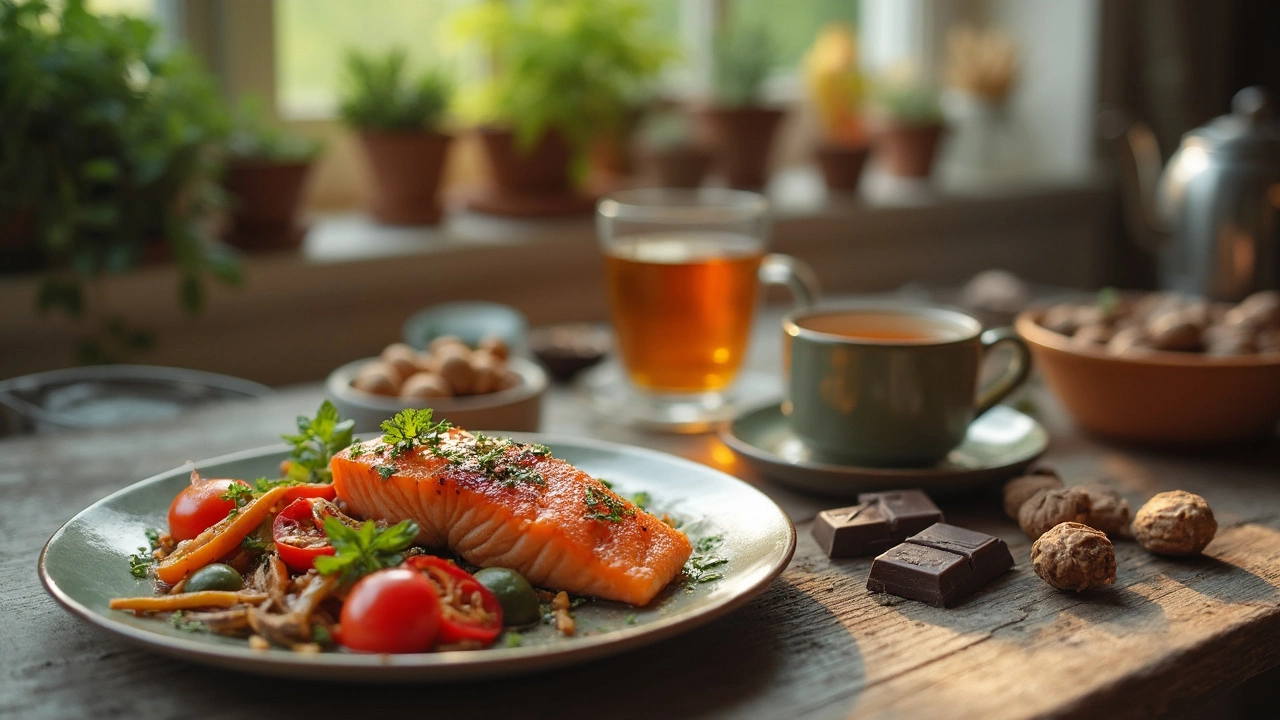Strange but true: when stress hits, your cravings know exactly what aisle to head for—mac and cheese, chocolate, or maybe a big bowl of ramen. But why do those foods work their magic when you're tense? It isn't just about nostalgia or taste. There's real science behind why our brains and bodies reach for certain meals when we need to chill out.
Think about it—comfort foods are usually simple, hearty, and loaded with carbs or creamy textures. Try picturing a bowl of mashed potatoes or warm banana bread. These aren't just filling; they make you feel safe and relaxed, turning stress down a notch or two. It's partly because carbs help boost serotonin, the "feel-good" brain chemical.
But before you write off comfort eating as just emotional, it's worth knowing that picking the right foods can actually help reduce tension without leaving you sluggish or guilty. That's where some smart tips and swaps come in: you don't have to live on instant noodles to take the edge off a bad day. There are plenty of ways to enjoy comfort food that just make sense for real life.
- How Comfort Foods Soothe Stress
- Top Comfort Foods That Actually Work
- Balancing Taste and Nutrition
- Quick Comfort Food Recipes Anyone Can Make
How Comfort Foods Soothe Stress
Ever notice that during a rough week, your brain doesn’t scream for salad? That’s not random. When you’re stressed, your body pumps out more cortisol, a hormone linked to anxiety and cravings for food that’s rich in carbs and fat. It’s nature’s way of convincing you to stock up on quick energy. But it’s not just about calories—a big part of this has to do with brain chemistry.
When you eat foods full of carbohydrates, like pasta or potatoes, your body gets a boost of serotonin—a chemical that helps you relax and lift your mood. There’s real proof on this: a Harvard Medical School review said that eating carbs can trigger serotonin release, which literally has a calming effect on your brain. This explains why bagels can feel more comforting than celery sticks.
It’s not just carbs, either. Familiar dishes and flavors tap into memories from better times—think grandma’s chicken soup or the pancakes you had growing up. This kind of nostalgia actually helps the brain lower stress, kicking off pleasant feelings and helping you unwind faster. Your senses link up powerful memories and emotions with the taste and smell of that specific food.
If you like numbers, check this out:
| Comfort Food | Main Benefit | Serotonin Impact |
|---|---|---|
| Oatmeal | Boosts energy, warmth | High |
| Chocolate | Quick mood lift | Moderate to High |
| Mashed Potatoes | Satisfying, creamy texture | Moderate |
| Chicken Soup | Nostalgia, easy digestion | Low |
The kicker? Comfort foods don’t just fix the emotional part of stress. Some can actually slow your heart rate or settle your gut if you pick the right stuff. There’s even evidence that familiar meals can lower anxiety and help people recover faster from stressful events.
If you’re reaching for comfort foods, you’re not giving in—you’re following some pretty clever wiring in your brain. The trick is picking foods that hit the spot without causing you to crash or feel guilty later on. More on those smart choices in the next section.
Top Comfort Foods That Actually Work
If you’re wondering what makes a comfort food truly effective when you’re stressed, it’s about more than just flavor. There’s a connection between the foods we choose and how our bodies handle anxiety. Let’s break down a few favorites that actually make a difference—and why they work.
- Mac and Cheese: That creamy, cheesy combo is the ultimate mood-lifter, and not just for sentimental reasons. Cheddar is high in tryptophan, which helps your brain churn out serotonin—the "feel good" chemical. Plus, carbs in pasta support this process.
- Dark Chocolate: A 2022 study from the Journal of Nutritional Biochemistry found that people who ate 40 grams of dark chocolate daily for two weeks reported lower stress hormones. Cocoa’s antioxidants help, but so does the small sugar rush.
- Chicken Noodle Soup: Warm soup isn't just for colds—hot broth actually lowers body tension and salt helps your body retain water, which can combat fatigue. And if mom or dad used to make it, there’s that bonus nostalgia hit.
- Bananas: Not the flashiest comfort food, but bananas are loaded with vitamin B6. This helps with dopamine and serotonin production, making them a solid grab-and-go option any time of day.
If you’re looking for numbers, here’s how some top picks stack up when it comes to nutrients that support stress relief:
| Comfort Food | Main Stress-Fighting Nutrient | How It Helps |
|---|---|---|
| Oatmeal | Complex carbs | Boosts serotonin, keeps blood sugar steady |
| Salmon | Omega-3 fatty acids | Reduces anxiety and inflammation |
| Greek Yogurt | Probiotics, protein | Supports gut health and mood |
| Sweet Potatoes | Fiber, magnesium | Helps muscle and nerve relaxation |
Notice a pattern? The best comfort foods for stress are usually filling, have something warm or creamy going on, and actually feed your body the stuff it needs to balance out the chaos. Keep a few of these on hand, and you’re way better equipped to handle whatever the day throws at you.

Balancing Taste and Nutrition
It’s easy to grab anything cheesy or sugary when you need stress relief, but if you stick to just that, your energy won’t last—and your mood might even drop. Here’s the deal: the comfort foods that really help balance both taste and nutrition usually combine the classics with a few healthier tweaks. That way, you still get the cozy vibes but without the heavy “food coma” aftermath.
The trick is to focus on foods that fill you up and help your body at the same time. For example, try swapping white pasta for whole grain and toss in veggies with your mac and cheese. Want mashed potatoes? Mix in cauliflower or Greek yogurt for creaminess with less fat and more nutrients. Or, if you’re craving something sweet, roasted fruit like apples or bananas feels warm and rich—without the added junk.
- Choose high-fiber versions of your favorites, like brown rice or whole-wheat bread.
- Mix in vegetables for volume and vitamins—for example, carrots in your stew or spinach in lasagna.
- Use lean proteins like chicken or beans instead of fatty meats. They soothe hunger and bring lasting energy.
- Don’t skip healthy fats. A bit of olive oil, avocado, or nuts makes food taste good and keeps you satisfied.
One cool fact: a 2023 study by Harvard found that swapping just one sugary snack each day for fruit or nuts actually led to lower stress markers in adults. It’s not about ditching treats completely, but making smart changes so your comfort food still does its main job—helping you feel better, right now and later.
| Food Swap | Benefit |
|---|---|
| Whole grain pasta for white pasta | More fiber, steady energy |
| Greek yogurt for sour cream | More protein, fewer calories |
| Roasted veggies for fries | Less fat, more vitamins |
| Lean chicken or tofu for fatty cuts of beef | Less saturated fat, easier to digest |
For people who love comfort foods but want to keep things balanced, it’s totally possible—and it doesn’t mean losing out on flavor. Just small swaps can mean you get all the feelings of comfort without the crash. And hey, your body and mind will both thank you for it. If you focus on the comfort foods that get the taste right and still pack in the nutrition, eating under stress turns into a real win-win.
Quick Comfort Food Recipes Anyone Can Make
When stress knocks and you want relief fast, a recipe that’s both tasty and simple always hits the spot. No need for a chef’s hat—just a few kitchen staples and you’re set. The cool thing? Some classics offer real comfort without tons of prep.
Here are a few favorites you can whip up, even on your worst days:
- Mac and Cheese: Boxed stuff is fine, but you can make it heartier and tastier in less than 20 minutes. Just cook pasta, stir in a handful of shredded cheese, a splash of milk, and a small spoon of butter. Want it healthier? Throw in spinach or frozen peas.
- Banana Pancakes: Got overripe bananas? Mash one with an egg and a tablespoon of flour. Spoon it onto a hot, nonstick pan. Flip when edges are firm. Top with a little honey or peanut butter for an instant mood boost.
- Classic Grilled Cheese: Use whole-grain bread for extra fiber. Butter the outside, add your favorite cheese, and grill until golden brown. Pair with store-bought tomato soup if you want the full nostalgia package.
- One-Pot Chicken Rice: Toss diced chicken, uncooked rice, broth, and frozen veggies into a pot. Bring to a boil, cover, and simmer until most of the liquid’s gone—about 20 minutes. Quick, filling, and you barely have to clean up after.
If you’re short on time or energy, keep this trick in mind: prep extra portions and freeze them. That way, you’ll have a homemade option ready the next time stress takes over. Keeping your pantry stocked with basics like pasta, rice, and some frozen veggies means you’re always just a few steps away from comfort when you need it most.
Sometimes instant relief means making do with what you have, but remember, these familiar comfort foods can still make you feel better without costing you tons of time or effort.

